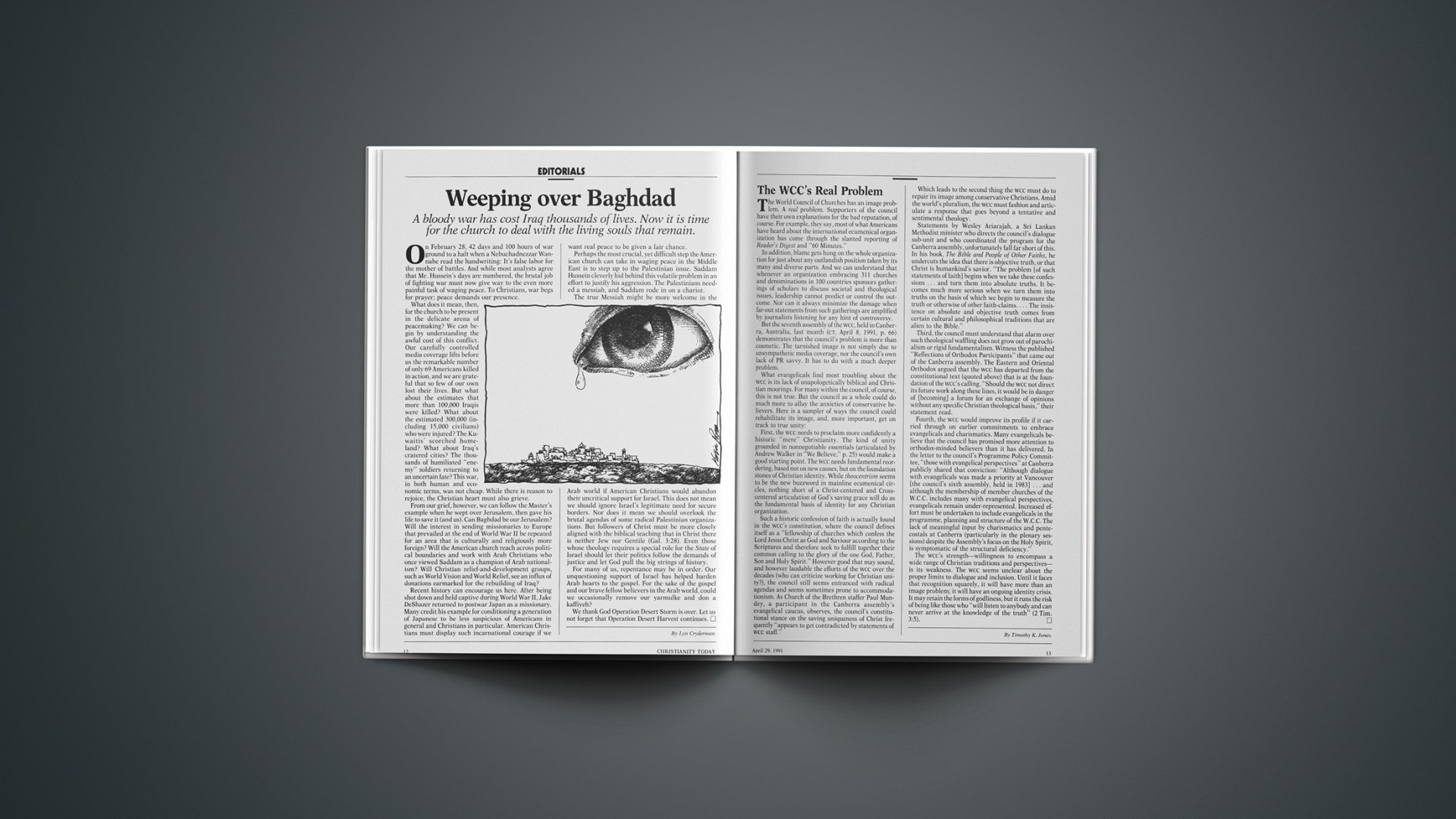A bloody war has cost Iraq thousands of lives. Now it is time for the church to deal with the living souls that remain.
On February 28, 42 days and 100 hours of war ground to a halt when a Nebuchadnezzar Wannabe read the handwriting: It’s false labor for the mother of battles. And while most analysts agree that Mr. Hussein’s days are numbered, the brutal job of fighting war must now give way to the even more painful task of waging peace. To Christians, war begs for prayer; peace demands our presence.
What does it mean, then, for the church to be present in the delicate arena of peacemaking? We can begin by understanding the awful cost of this conflict. Our carefully controlled media coverage lifts before us the remarkable number of only 69 Americans killed in action, and we are grateful that so few of our own lost their lives. But what about the estimates that more than 100,000 Iraqis were killed? What about the estimated 300,000 (including 15,000 civilians) who were injured? The Kuwaitis’ scorched homeland? What about Iraq’s cratered cities? The thousands of humiliated “enemy” soldiers returning to an uncertain fate? This war, in both human and economic terms, was not cheap. While there is reason to rejoice, the Christian heart must also grieve.
From our grief, however, we can follow the Master’s example when he wept over Jerusalem, then gave his life to save it (and us). Can Baghdad be our Jerusalem? Will the interest in sending missionaries to Europe that prevailed at the end of World War II be repeated for an area that is culturally and religiously more foreign? Will the American church reach across political boundaries and work with Arab Christians who once viewed Saddam as a champion of Arab nationalism? Will Christian relief-and-development groups, such as World Vision and World Relief, see an influx of donations earmarked for the rebuilding of Iraq?
Recent history can encourage us here. After being shot down and held captive during World War II, Jake DeShazer returned to postwar Japan as a missionary. Many credit his example for conditioning a generation of Japanese to be less suspicious of Americans in general and Christians in particular. American Christians must display such incarnational courage if we want real peace to be given a fair chance.
Perhaps the most crucial, yet difficult step the American church can take in waging peace in the Middle East is to step up to the Palestinian issue. Saddam Hussein cleverly hid behind this volatile problem in an effort to justify his aggression. The Palestinians needed a messiah, and Saddam rode in on a chariot.
The true Messiah might be more welcome in the Arab world if American Christians would abandon their uncritical support for Israel. This does not mean we should ignore Israel’s legitimate need for secure borders. Nor does it mean we should overlook the brutal agendas of some radical Palestinian organizations. But followers of Christ must be more closely aligned with the biblical teaching that in Christ there is neither Jew nor Gentile (Gal. 3:28). Even those whose theology requires a special role for the State of Israel should let their politics follow the demands of justice and let God pull the big strings of history.
For many of us, repentance may be in order. Our unquestioning support of Israel has helped harden Arab hearts to the gospel. For the sake of the gospel and our brave fellow believers in the Arab world, could we occasionally remove our yarmulke and don a kaffiyeh?
We thank God Operation Desert Storm is over. Let us not forget that Operation Desert Harvest continues.










